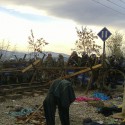
The EU has finally struck a deal with the Turkish government at 29.10.2015 in which 3 bilion Euros per yer, visa liberalizations and unfrozen EU membership negotiations, negotiations that the EU froze with Turkey in 2005 under pretense of R. Erdoğans government style as authoritative, will be exchanged for the Turkish role as an external Schengen border ‘guardian’. With this EU again proved that its interests have to be protected at all costs, quickly ignoring previous comments regarding the current Turkish president R. Erdoğan, as well as his increased surpression of Kurdish people, media critics and activists in the recent years. Political Machiavellism labels and continue to label Western politics throughout the history and it doesn’t leave out other political actors around the globe.
Immediately after strucking a deal with the EU, Turkey launched a police action at its coastline near the city Ayvacik, a common location to be smuggled to Greece, arresting all the people, including people from Afganistan, Syria and Irak, who were the only nationalities that are for nearly two weeks allowed to pass to their desired location through the so called ‘Balkan’ border. The process of selection on the basis of nationality goes against the UNHCR conventions regarding the displaced people who flee their homeland to persue safer and better environment for their life. Besides national segregation and filtering the increased maritime operations at the Mediterranean sea, which was even before the so called ‘refugee crisis’ one of the most militarized borders in the world, are endorsed and enacted to prevent people reaching Greece.
Meantime Macedonia already started erupting its own fences at Gavgelija border with Greece (source: http://www.ibtimes.com/european-refugee-crisis-macedonia-builds-fence-along-greek-border-how-will-europe-2202836), and planing to build 50km of fences with the letter. For nearly two weeks people who are not from Syria, Iraq and Afganistan and are prevented to cross the border. A quick reminder, when Austria and Slovenia said they will not let anymore anyone through who is not from the mentioned countries and this time explicitly labeled all other nationalities as ‘economic migrants’, a suspected domino effect followed all to the Greek-Macedonian border which started to do the same. Resistance against the police and the demands for the freedom of movement at the Idomeni border is a constant struggle from the people who are trapped in the no mans land. As activists of Idomeni at 30.11.2015 reported:
‘Situation in #Idomeni camp on the border with Macedonia is still very tense, as around 2.500 people are not alowed to pass the border due to their nationality. International volunteers have reported that big aid organizations are focused entirely inside the camp with the “right refugees”. Outside the camp there are only a handful of volunteers dealing with the 2.500 and growing group of people stuck in no man land. Today at least they didn’t have rain, but the weather is very cold and lots of refugees are still sleeping in the open. Our colleagues in Idomeni are asking for more volunteers, but also donations of tents, raincoats, sleeping bags, shoes, warm clothes, blankets (especially thermal blankets), baby clothes and baby food. If you can help, please contact forgotteninidomeni@gmail.com or ask us for a direct contact of the volunteers on the ground.’
Such developments only give more power to the smugglers and push people to search for more dangerous ways to reach their desired destinations.
The so called ‘refugee crisis’ should not be understood as a humanitarian crisis, but a political crisis of the European – whether direct or indirect – dealing with its imperial past and neocolonial present, while not denying other global political actors. It is also a serie of crisis of the global neoliberal acummulation of capital by appropriation of the local resources which builds on colonial legacies. The recent flow of people is nothing new and not only a response to such historical and contemporary developments, but also a continuous autonomus struggle and desire for freedom which destroys or at least forces to reshape the existing borders that serve to accumulate capital in the old and new imperial centers and for its owners, leaving crumbs for the others.
As also the somewhat ambivalent critical discourse of ‘adressing and aiming at the causes for emigration’ penetrated within the present EU’s policies – of course remodified according to its intereses – dealing with the flows of people within its borders, this is something what history told us that we should not simply accept. Only when Europe will put a mirror infront of itself, then it will see the true causes.
Solidarity & peace.
